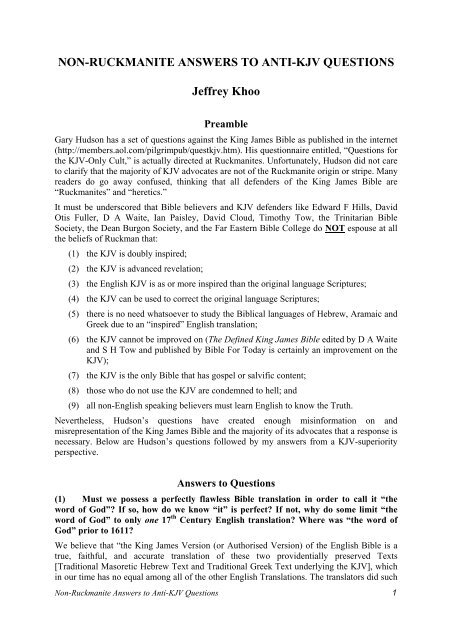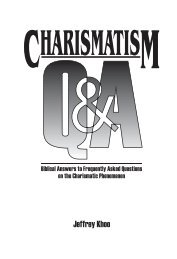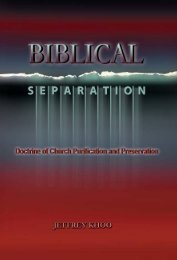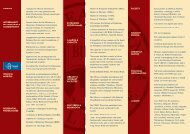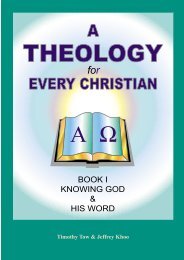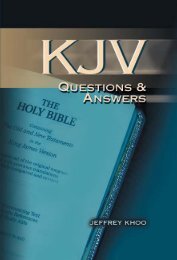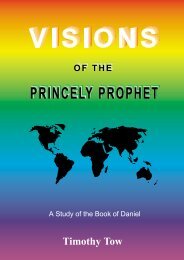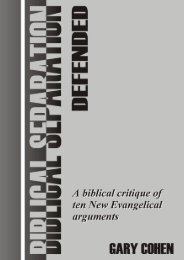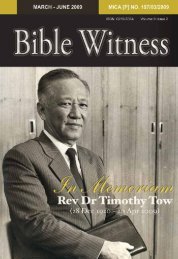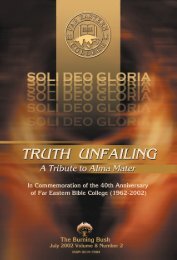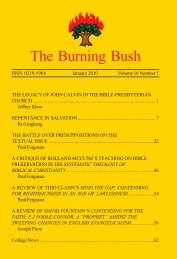Questions for the KJV-only cult by Gary R - Far Eastern Bible College
Questions for the KJV-only cult by Gary R - Far Eastern Bible College
Questions for the KJV-only cult by Gary R - Far Eastern Bible College
You also want an ePaper? Increase the reach of your titles
YUMPU automatically turns print PDFs into web optimized ePapers that Google loves.
a fine job in <strong>the</strong>ir translation task that we can without apology hold up <strong>the</strong> AuthorisedVersion and say ‘This is <strong>the</strong> Word of God!’ while at <strong>the</strong> same time realising that, in someverses, we must go back to <strong>the</strong> underlying original language Texts <strong>for</strong> complete clarity, andalso compare Scripture with Scripture.” (The Dean Burgon Society, “Articles of Faith,”section II.A.)Every <strong>Bible</strong> translation can be legitimately called “<strong>the</strong> Word of God” if it is true and faithfulto <strong>the</strong> original and traditional text. We refuse to consider heretical <strong>Bible</strong>s like <strong>the</strong> New WorldTranslation of <strong>the</strong> Jehovah’s Witnesses as “<strong>the</strong> Word of God.” We also reject as unreliable all<strong>Bible</strong> versions (eg NIV, TEV, TLB, CEV …) that are a result of <strong>the</strong> dynamic equivalencemethod of translation, and those (eg RSV, NASB, ESV …) that cast doubt and/or omit versesbased on corrupted readings of <strong>the</strong> Alexandrian or Westcott-Hort Text, and consider <strong>the</strong>munsafe <strong>for</strong> use.Where was <strong>the</strong> Word of God prior to 1611? Well, <strong>the</strong> Word of God is found in <strong>the</strong> divinelyinspired and perfectly preserved Traditional Text of OT and NT Scriptures used andrecognised <strong>by</strong> <strong>the</strong> Church down through <strong>the</strong> ages, and in all <strong>the</strong> faithful and reliabletranslations that were based on those Texts, viz, Martin Lu<strong>the</strong>r’s German <strong>Bible</strong> (1522),William Tyndale’s <strong>Bible</strong> (1525), Myles Coverdale’s <strong>Bible</strong> (1535), The Mat<strong>the</strong>w’s <strong>Bible</strong>(1537), The Great <strong>Bible</strong> (1539-41), and The Geneva <strong>Bible</strong> (1557-60).It is significant to note that prior to <strong>the</strong> <strong>KJV</strong>, <strong>the</strong> English translations were largely individualef<strong>for</strong>ts. The <strong>KJV</strong> on <strong>the</strong> o<strong>the</strong>r hand is a corporate work. In <strong>the</strong> words of <strong>the</strong> translators, <strong>the</strong><strong>KJV</strong> was not produced “to make a bad one a good one; but to make a good one better, or outof many good ones one principal good one.” For this purpose and with such devotion <strong>the</strong><strong>KJV</strong> translation committee was <strong>for</strong>med, and <strong>the</strong>y were careful to “assemble toge<strong>the</strong>r; not toomany, lest one should trouble ano<strong>the</strong>r; and yet many, lest many things haply might escape<strong>the</strong>m.”The King James <strong>Bible</strong> is a product of <strong>the</strong> 16 th Century Protestant Re<strong>for</strong>mation. The specialprovidential hand of God was clearly at work at <strong>the</strong> time of <strong>the</strong> Re<strong>for</strong>mation not <strong>only</strong> in <strong>the</strong>separation of <strong>the</strong> true church from <strong>the</strong> false church, but also in <strong>the</strong> invention of <strong>the</strong> printingpress, <strong>the</strong> renewed interest in <strong>the</strong> study of <strong>the</strong> original languages, <strong>the</strong> identification of <strong>the</strong>purest Greek Text (Textus Receptus) which became <strong>the</strong> source text <strong>for</strong> <strong>the</strong> <strong>KJV</strong>. Theseproducts of <strong>the</strong> Protestant Re<strong>for</strong>mation bear <strong>the</strong> divine imprimatur.God holds His people in every age responsible <strong>for</strong> using <strong>the</strong> divinely inspired and preservedoriginal texts and <strong>only</strong> <strong>the</strong> faithful and accurate translations of His Word. The <strong>KJV</strong>superiorityposition does not limit <strong>the</strong> Word of God to <strong>only</strong> one 17 th Century EnglishTranslation, but advocates that <strong>the</strong> <strong>KJV</strong>, being still <strong>the</strong> most accurate English translationbased on <strong>the</strong> purest texts, should be <strong>the</strong> <strong>only</strong> <strong>Bible</strong> used <strong>by</strong> English-speaking Christianstoday. To use o<strong>the</strong>r <strong>Bible</strong>s when <strong>the</strong> best is clearly available would be to neglect ourresponsibility.(2) Were <strong>the</strong> <strong>KJV</strong> translators “liars” <strong>for</strong> saying that “<strong>the</strong> meanest translation” isstill “<strong>the</strong> word of God”?The 1611 Preface of <strong>the</strong> <strong>KJV</strong> is often used <strong>by</strong> anti-<strong>KJV</strong>ists to support <strong>the</strong> corrupt modernversions. They argue that in that Preface <strong>the</strong> <strong>KJV</strong> translators <strong>the</strong>mselves viewed even <strong>the</strong>worst English versions as <strong>the</strong> Word of God. Did <strong>the</strong> <strong>KJV</strong> translators really say that everytranslation of <strong>the</strong> <strong>Bible</strong> even if filled with grammatical, translational, or doctrinal errors couldbe rightly called <strong>the</strong> Word of God? They certainly did not. The context in which <strong>the</strong>y wrotethose words clearly reveals this: “Now to <strong>the</strong> latter we answer, that we do not deny, nay, weaffirm and avow, that <strong>the</strong> very meanest translation of <strong>the</strong> <strong>Bible</strong> in English set <strong>for</strong>th <strong>by</strong> men ofNon-Ruckmanite Answers to Anti-<strong>KJV</strong> <strong>Questions</strong> 2
No, <strong>the</strong>y were not liars, because <strong>the</strong> term “original Greek” indeed refers to <strong>the</strong> inspired andpreserved Greek NT Text <strong>the</strong>y had. The term “original” <strong>only</strong> means that <strong>the</strong> NT wasoriginally written in Greek.(13) Was <strong>the</strong> “original Greek” lost after 1611?No, <strong>the</strong> “original Greek” continues to exist to this day, and we call it <strong>the</strong> Textus ReceptusGreek New Testament.(14) Did <strong>the</strong> great Protestant Re<strong>for</strong>mation (1517-1603) take place without “<strong>the</strong> wordof God”?Of course not! The Protestant Re<strong>for</strong>mation arose because of <strong>the</strong> <strong>Bible</strong>. Sola Scriptura(Scriptures Alone) was one of <strong>the</strong> Re<strong>for</strong>mation pillars. What were <strong>the</strong> pre-1611 <strong>Bible</strong>s thatwere “<strong>the</strong> Word of God”? They were <strong>the</strong> Wycliffe <strong>Bible</strong> (1382), <strong>the</strong> Tyndale <strong>Bible</strong> (1525),<strong>the</strong> Coverdale <strong>Bible</strong> (1535), <strong>the</strong> Mat<strong>the</strong>w <strong>Bible</strong> (1537), <strong>the</strong> Taverner <strong>Bible</strong> (1539), <strong>the</strong> Great<strong>Bible</strong> (1539), <strong>the</strong> Geneva <strong>Bible</strong> (1560), and <strong>the</strong> Bishops’ <strong>Bible</strong> (1568), all of which facilitated<strong>the</strong> Re<strong>for</strong>mation cause, and were faithful precursors to <strong>the</strong> King James <strong>Bible</strong>.(15) What translation of “<strong>the</strong> word of God,” used <strong>by</strong> <strong>the</strong> Re<strong>for</strong>mers, was absolutelyinfallible and inerrant?Every translation of <strong>the</strong> Word of God used <strong>by</strong> <strong>the</strong> Re<strong>for</strong>mers that was faithfully translatedand based on <strong>the</strong> pure and preserved OT Masoretic Text and NT Received Text may rightlybe considered <strong>the</strong> Word of God, infallible and inerrant insofar as <strong>the</strong>y accurately reflect <strong>the</strong>original text.(16) If <strong>the</strong> <strong>KJV</strong> is “God’s infallible and preserved word to <strong>the</strong> English-speakingpeople,” did <strong>the</strong> “English-speaking people” have “<strong>the</strong> word of God” from 1525-1604?Yes, <strong>the</strong>y did, because <strong>the</strong>y were using faithful translations that were based on <strong>the</strong> pure andpreserved OT Masoretic Text and NT Received Text. They were also using <strong>the</strong> most accurateversions of <strong>the</strong>ir time, and that is <strong>the</strong> main thing that God expects of His people.(17) Was Tyndale’s (1525), or Coverdale’s (1535), or Mat<strong>the</strong>w’s (1537), or <strong>the</strong> Great(1539), or Geneva (1560) … English <strong>Bible</strong>s absolutely infallible?Answered in Qs14, 15, and 16.(18) If nei<strong>the</strong>r <strong>the</strong> <strong>KJV</strong> nor any o<strong>the</strong>r one version were absolutely inerrant, could alost sinner still be “born again” <strong>by</strong> <strong>the</strong> “incorruptible word of God” (1 Pet 1:23)?A lost sinner can be and must be born again <strong>by</strong> <strong>the</strong> “incorruptible word of God” (1 Pet 1:23).God’s Word has been purely preserved in <strong>the</strong> Hebrew Masoretic Text and Greek TextusReceptus. Any accurate translation based on this can be used of God to save sinners.Can <strong>the</strong> NIV, <strong>for</strong> instance, lead someone to salvation? Here is an answer from <strong>the</strong> Trinitarian<strong>Bible</strong> Society: “The NIV contains enough truth to be used of <strong>the</strong> Holy Spirit to draw a man to<strong>the</strong> Saviour. But although it contains truth, is it <strong>the</strong> very Word of God? If not, Christians mustbe urged to return to <strong>the</strong> truth.”There is no denial that sinners may be saved through <strong>the</strong> modern versions if such versionscontain enough of <strong>the</strong> gospel (1 Cor 15:1-4), just like a person may be saved <strong>by</strong> hearing asermon or reading a tract. This however does not mean that God sanctions such versions orthat <strong>the</strong> Church should continue using <strong>the</strong>m. Remember, God still holds His peopleresponsible to use <strong>the</strong> most faithful translation, based on <strong>the</strong> purest text.(19) If <strong>the</strong> <strong>KJV</strong> can “correct” <strong>the</strong> inspired originals, did <strong>the</strong> Hebrew and Greekoriginally “brea<strong>the</strong>d out <strong>by</strong> God” need correction or improvement?Non-Ruckmanite Answers to Anti-<strong>KJV</strong> <strong>Questions</strong> 6
Answered in Q5.(20) Since most “<strong>KJV</strong>-Onlyites” believe <strong>the</strong> <strong>KJV</strong> is <strong>the</strong> inerrant and inspired“scripture” (2 Pet 1:20), and 2 Pet 1:21 says that “<strong>the</strong> prophecy came not in old time <strong>by</strong><strong>the</strong> will of man: but holy men of God spake as <strong>the</strong>y were moved <strong>by</strong> <strong>the</strong> Holy Ghost,”would you not <strong>the</strong>re<strong>for</strong>e reason thus—“For <strong>the</strong> King James Version came not in 1611<strong>by</strong> <strong>the</strong> will of man: but holy men of God translated as <strong>the</strong>y were moved <strong>by</strong> <strong>the</strong> HolyGhost”?This question assumes all <strong>KJV</strong>-Only advocates to be Ruckmanites who believe that <strong>the</strong> <strong>KJV</strong>was given <strong>by</strong> divine inspiration. This is a very unfair and untrue representation of <strong>the</strong> facts. Itwould be absurd to ascribe to a translation <strong>the</strong> same degree of perfection that <strong>the</strong> Holy Spiritgave in <strong>the</strong> inspiration of <strong>the</strong> original language Scriptures. The divine inspiration of <strong>the</strong>original language Scriptures is quite different from <strong>the</strong> translation of <strong>the</strong> Scriptures <strong>for</strong> notranslators can claim divine inspiration <strong>for</strong> <strong>the</strong>ir translation work. None<strong>the</strong>less, <strong>the</strong> <strong>KJV</strong>pastors and scholars faithfully and accurately translated <strong>the</strong>ir English <strong>Bible</strong> from <strong>the</strong> inspiredand inerrant Hebrew, Aramaic and Greek words that God has providentially and infalliblypreserved.(21) Which reading is <strong>the</strong> verbally (word-<strong>for</strong>-word) inerrant scripture—“whom ye”(Cambridge <strong>KJV</strong>’s) or “whom he” (Ox<strong>for</strong>d <strong>KJV</strong>’s) at Jer 34:16?The reading “whom ye” in <strong>the</strong> Cambridge <strong>KJV</strong> is correct. In Jer 34:16, <strong>the</strong> Hebrew!T,j]L'vi (shillach<strong>the</strong>m) is <strong>the</strong> piel perfect <strong>for</strong>m of <strong>the</strong> root jl'v; (shalach) with a 2 nd masculineplural suffix. The verbally inerrant reading is thus “whom ye.” The Ox<strong>for</strong>d “whom he” has tobe a spelling/typing/printing error.(22) Which reading is <strong>the</strong> verbally (word-<strong>for</strong>-word) inerrant scripture—“sin”(Cambridge <strong>KJV</strong>’s) or “sins” (Ox<strong>for</strong>d <strong>KJV</strong>’s) at 2 Chron 33:19?The Hebrew word used in 2 Chron 33:19 is /taF;j' (chattatho), a feminine singular noun witha 3 rd masculine singular suffix (see BDB, sv taF;j', 308). Again <strong>the</strong> Cambridge <strong>KJV</strong>, “hissin,” is correct (see Q21 above).(23) Who publishes <strong>the</strong> infallible “inerrant <strong>KJV</strong>”?The British Crown owns <strong>the</strong> copyright to <strong>the</strong> <strong>KJV</strong>, and hence <strong>the</strong> right to grant permission topublish it to whomever she wishes. Her Majesty Queen Elizabeth II licensed <strong>only</strong> WilliamCollins Sons and Company Limited to print and publish <strong>the</strong> <strong>KJV</strong> in 1958. However, it doesseem that <strong>the</strong> Crown does not care too much to en<strong>for</strong>ce her copyright. The <strong>KJV</strong> is publishedtoday <strong>by</strong> not a few University Presses, <strong>Bible</strong> Societies, publishing houses, and softwarecompanies in Britain and America and elsewhere. As regards <strong>the</strong> “inerrant <strong>KJV</strong>” see Q24below.(24) Since <strong>the</strong> revisions of <strong>the</strong> <strong>KJV</strong> from 1613-1850 [sic] made … many hundreds ofchanges [sic] … would you say <strong>the</strong> <strong>KJV</strong> was “verbally inerrant” in 1611 … or 1629,1638, 1644, 1664, 1701, 1744, 1762, 1769, or 1850 [sic]?When we talk about infallibility, inerrancy, and inspiration, we are primarily referring to <strong>the</strong>Hebrew, Aramaic, and Greek words of <strong>the</strong> Holy Scriptures. A <strong>Bible</strong> translation is “infallible,”and “inerrant” <strong>only</strong> to <strong>the</strong> extent that it is faithful and accurate to <strong>the</strong> Hebrew and GreekScriptures, and even <strong>the</strong>n its “inerrancy,” and “infallibility” is not direct but derived.It must be noted that <strong>the</strong> changes to <strong>the</strong> <strong>KJV</strong> were not due to any change in <strong>the</strong> Hebrew andGreek Text, but to <strong>the</strong> refinements that have been made to <strong>the</strong> English language itself, and to<strong>the</strong> typographical or typesetting mistakes that arose out of <strong>the</strong> printing process. The originalNon-Ruckmanite Answers to Anti-<strong>KJV</strong> <strong>Questions</strong> 7
language text itself is verbally inerrant. Translations made from that text would share in <strong>the</strong>verbal inerrancy of <strong>the</strong> text insofar as <strong>the</strong>y are accurate word-<strong>for</strong>-word translations of <strong>the</strong> text.Thus, refinement and improvement in translation was not <strong>only</strong> possible, but also needful (seeanswer to Q8).(25) Would you contend that God waited until a king named “James” sat on <strong>the</strong>throne of England be<strong>for</strong>e perfectly preserving His Word in English, and would youthink well … if <strong>the</strong> historical fact was revealed to you that King James was a practicinghomosexual all his life?There are those who say that King James was a homosexual, and <strong>the</strong>re are those who thinknot (recently, a scholarly 392-page book <strong>by</strong> Stephen A Coston Sr, King James <strong>the</strong> VI ofScotland and <strong>the</strong> I of England: Unjustly Accused? [St Petersburg: KoenigsWort Incorporated,1996], takes <strong>the</strong> latter view). But <strong>for</strong> argument’s sake, let us say King James washomosexual. Being homosexual he would surely alter scriptural texts that speak against <strong>the</strong>sin of homosexuality. We do not find such alterations in <strong>the</strong> <strong>KJV</strong>. On <strong>the</strong> contrary, we findintact such passages as Rom 1:26-27 speaking out against “vile affections; <strong>for</strong> even <strong>the</strong>irwomen did change <strong>the</strong> natural use into that which is against nature: And likewise also <strong>the</strong>men, leaving <strong>the</strong> natural use of <strong>the</strong> woman, burned in <strong>the</strong>ir lust one toward ano<strong>the</strong>r; men withmen working that which is unseemly, and receiving in <strong>the</strong>mselves that recompence of <strong>the</strong>irerror which was meet.” If King James were truly homosexual, he would be expected tochange or dilute this passage. There was no such tampering. In any case, even if King Jameswas homosexual, he was not among <strong>the</strong> translators, and had no part in <strong>the</strong> translating work.(26) Would you contend that <strong>the</strong> <strong>KJV</strong> translator, Richard Thomson, who worked onGenesis-Kings in <strong>the</strong> Westminster group, was “led <strong>by</strong> God in translating” even thoughhe was an alcoholic that “drank his fill daily” throughout <strong>the</strong> work? (Gustavus Paine,The Men Behind <strong>the</strong> <strong>KJV</strong>, 40, 69).No one can ever claim that <strong>the</strong> men who translated <strong>the</strong> <strong>KJV</strong> were perfectly sinless. If <strong>the</strong>ywere alive, <strong>the</strong>y would probably be <strong>the</strong> first to admit <strong>the</strong>ir sins, and confess <strong>the</strong> grace of Godthat allowed <strong>the</strong>m <strong>the</strong> privilege of being involved in <strong>the</strong> <strong>Bible</strong> translation work. Even <strong>the</strong>original OT and NT writers of <strong>the</strong> Scriptures were not perfect men. For example, Davidcommitted adultery and yet God used him to write <strong>the</strong> Psalms. Peter denied Christ three timesand yet wrote 1-2 Peter. Generally speaking, <strong>the</strong>re is no reason to doubt that <strong>the</strong> men whotranslated <strong>the</strong> <strong>KJV</strong>, like <strong>the</strong> biblical writers, were regenerate men of piety, godliness anderudite scholarship, <strong>the</strong>ir weaknesses and failings of <strong>the</strong> flesh notwithstanding.Now, what about Richard Thomson? Richard Montague called him “a most admirablephilologist,” and no doubt <strong>for</strong> this reason he was inducted into <strong>the</strong> translation committee.Paine says that he was among <strong>the</strong> “younger men.” What about his drinking? McClure wouldhave us know that Thomson’s alcoholism occurred in his later years, and not necessarilyduring <strong>the</strong> time he worked on <strong>the</strong> <strong>KJV</strong>. At any rate, even if Thomson did drink, Paine tells usthat “he arose in <strong>the</strong> morning with his head clear enough to go <strong>for</strong>ward competently with <strong>the</strong>day’s work.”The <strong>Bible</strong> teaches <strong>the</strong> divine inspiration of <strong>the</strong> words and not <strong>the</strong> men whe<strong>the</strong>r apostles,prophets, scribes or translators. The men were spiritually guided (2 Pet 1:21), but <strong>the</strong> wordswere divinely inspired and absolutely inerrant not <strong>only</strong> in matters of salvation, but also inmatters of history, geography and science (2 Tim 3:16).(27) Is it possible that <strong>the</strong> rendition “gay clothing,” in <strong>the</strong> <strong>KJV</strong> at Jas 2:3, could give<strong>the</strong> wrong impression to <strong>the</strong> modern-English <strong>KJV</strong> reader?Non-Ruckmanite Answers to Anti-<strong>KJV</strong> <strong>Questions</strong> 8
It is un<strong>for</strong>tunate that <strong>the</strong> word “gay” today has acquired a negative connotation. The modernEnglish <strong>KJV</strong> reader however would not be misled, when he reads <strong>the</strong> context of Jas 2:3 –“And ye have respect to him that weareth <strong>the</strong> gay clothing, and say unto him, Sit thou here ina good place …” It is easy to see here that <strong>the</strong> word “gay” has nothing to do with homosexualattire, but with wealthy, ostentatious dressing.(28) Did dead people “wake up” in <strong>the</strong> morning according to Isa 37:36 in <strong>the</strong> <strong>KJV</strong>?In Isa 37:36, <strong>the</strong> <strong>KJV</strong> renders a literal and accurate translation of <strong>the</strong> Hebrew text: “Then <strong>the</strong>angel of <strong>the</strong> LORD went <strong>for</strong>th, and smote in <strong>the</strong> camp of <strong>the</strong> Assyrians a hundred andfourscore and five thousand: and when <strong>the</strong>y arose early in <strong>the</strong> morning, behold, <strong>the</strong>y were alldead corpses.” It is quite plain that “<strong>the</strong>y” who arose were not <strong>the</strong> same as “<strong>the</strong>y” who weredead corpses.(29) Was “Baptist” John’s last name according to Matt 14:8 and Luke 7:20 in <strong>the</strong><strong>KJV</strong>?In <strong>Bible</strong> times, as well as in <strong>KJV</strong> English, it was not uncommon to find a person surnamedwith his title or official designation. Eg Antiochus Epiphanes, Julius Caesar, JudasMaccabeus. The word “Baptist” was <strong>the</strong>re<strong>for</strong>e not John’s last name, but his well-knowndesignation.(30) Does 2 Cor 6:11-13 in <strong>the</strong> <strong>KJV</strong> make any sense to <strong>the</strong> modern English <strong>KJV</strong>reader as compared to <strong>the</strong> NIV?Although modern English versions may make certain verses easier to understand to <strong>the</strong>modern reader, <strong>the</strong>y may not be accurate to <strong>the</strong> true meaning or intent of <strong>the</strong> text. As a matterof fact, present-day English versions like <strong>the</strong> NIV, <strong>by</strong> using <strong>the</strong> loose “dynamic equivalence”method of translation, have gone too far in giving a modern and strange voice in an attempt toreplace <strong>the</strong> <strong>KJV</strong>.The NIV rendering of 2 Cor 6:11-13 is a case in point. It shows how <strong>the</strong> NIV is aninterpretation of or a commentary on <strong>the</strong> original text, and not a word-<strong>for</strong>-word translation.For example, <strong>the</strong> <strong>KJV</strong> practically translates word-<strong>for</strong>-word <strong>the</strong> meaning of <strong>the</strong> original text inverse 11, “to stoma hemon (our mouth) aneoge (is opened) pros (unto) humas (you),” but <strong>the</strong>NIV interprets <strong>the</strong> words as “We have spoken freely to you” which do not give <strong>the</strong> actual orprecise meaning of <strong>the</strong> verbally (not conceptually) inspired Scripture. In fact <strong>the</strong> originalwords mean much more than “free speech.” As such, <strong>the</strong> NIV should not be taken as “Holy<strong>Bible</strong>” since it does not translate <strong>the</strong> inspired words of God accurately word-<strong>for</strong>-word. Atbest, it is <strong>only</strong> a commentary on <strong>the</strong> <strong>Bible</strong> like any o<strong>the</strong>r commentary written <strong>by</strong> men and thusprone to human fallibility and subjectivity.Hence, we strongly discourage <strong>the</strong> use of <strong>the</strong> modern versions disguised as “Holy <strong>Bible</strong>” <strong>for</strong>personal study because of <strong>the</strong> many omissions, distortions, inaccuracies andmisinterpretations found in <strong>the</strong>m due to <strong>the</strong>ir corrupt source text and wrong method oftranslation. Instead, we recommend The Defined King James <strong>Bible</strong> published <strong>by</strong> The <strong>Bible</strong>For Today Press, 1998, where all <strong>the</strong> archaic words have <strong>the</strong>ir respective modern meaningsfootnoted <strong>for</strong> convenient reference. For example, <strong>the</strong> archaic word “straightened” in 2 Cor6:12 is footnoted as “closely restricted, hemmed in.” Readers today can thus easily read andunderstand <strong>the</strong> faithful and reliable <strong>KJV</strong>.(31) Does <strong>the</strong> singular “oath’s” occurring in every <strong>KJV</strong> at Matt 14:9 and Mark 6:26“correct” every Textus Receptus Greek which has <strong>the</strong> plural “oaths”?Although o{rkou" (horkous) is in <strong>the</strong> Greek plural, <strong>the</strong>re are times when it is legitimate torender <strong>the</strong> plural in <strong>the</strong> singular especially when it is a plural of majesty. At times <strong>the</strong> pluralNon-Ruckmanite Answers to Anti-<strong>KJV</strong> <strong>Questions</strong> 9
speaks not of multiplicity but of majesty. It seeks to highlight <strong>the</strong> grandiose nature of <strong>the</strong>meaning contained in <strong>the</strong> noun. This is probably <strong>the</strong> case with Matt 14:9 and Mark 6:26especially when we notice that <strong>the</strong> oath was given <strong>by</strong> a king. In o<strong>the</strong>r words, it was noordinary oath, but a royal oath, and must thus be doubly honoured <strong>by</strong> <strong>the</strong> king who made it.That was why Herod, though extremely reluctant to kill John, could not retract <strong>the</strong> promise hehad already made. The <strong>KJV</strong> translation, “<strong>for</strong> <strong>the</strong> oath’s sake,” is thus perfectly legitimate.(32) Did Jesus teach a way <strong>for</strong> men to be “worshipped” according to Luke 14:10 in<strong>the</strong> <strong>KJV</strong>, contradicting <strong>the</strong> first commandment and what He said in Luke 4:8?(Remember—you may not go to <strong>the</strong> Greek <strong>for</strong> any “light” if you are a <strong>KJV</strong>-Onlyite!)The word dovxa (doxa) here is to be distinguished from <strong>the</strong> usual “worship” (latreuvw,latreuo, and proskunevw, proskuneo) that is accorded to God. The context clearly shows that<strong>the</strong> word “worship” in Luke 14:10 has nothing to do with religious worship, but has <strong>the</strong>connotation of respect or honour given to men in high office or dignitaries. The <strong>KJV</strong> is thusnot self-contradictory in Luke 4:8 and 14:10.Although we strongly recommend <strong>the</strong> laity to use <strong>the</strong> <strong>KJV</strong> as <strong>the</strong>ir scriptural text in <strong>the</strong>irstudy of <strong>the</strong> <strong>Bible</strong>, we reject <strong>the</strong> fallacious view that <strong>the</strong> Greek <strong>Bible</strong> cannot be used to shedlight on <strong>the</strong> English text.(33) Is <strong>the</strong> Holy Spirit an “it” according to John 1:32; Rom 8:16, 26; and 1 Pet 1:11 in<strong>the</strong> <strong>KJV</strong>? (Again—you may not go to <strong>the</strong> Greek <strong>for</strong> any “light” if you are a <strong>KJV</strong>-Onlyite!)The word “it” here, with reference to <strong>the</strong> Holy Spirit, is <strong>the</strong> direct result of <strong>the</strong> literaltranslation of <strong>the</strong> neuter gender of <strong>the</strong> pronouns and participles in <strong>the</strong> Greek text that stand inagreement with <strong>the</strong> neuter gender <strong>for</strong> <strong>the</strong> Greek word <strong>for</strong> “spirit” (pneu'ma, pneuma). Thisdoes not mean that <strong>the</strong> <strong>KJV</strong> teaches that <strong>the</strong> Holy Spirit is an impersonal <strong>for</strong>ce. The citedverses <strong>the</strong>mselves show that this is not <strong>the</strong> case, as a <strong>for</strong>ce cannot bear witness with our spiritthat we are <strong>the</strong> children of God (Rom 8:16), make intercession <strong>for</strong> us (Rom 8:26) or testifybe<strong>for</strong>ehand of <strong>the</strong> sufferings of Christ (1 Pet 1:11). Only a person can do such things, and <strong>the</strong>Holy Spirit is a person—<strong>the</strong> 3 rd person of <strong>the</strong> Holy Trinity.Again—although we hold to a <strong>KJV</strong>-superiority position, we categorically reject <strong>the</strong> falseview that says <strong>the</strong> inspired Greek Text may not be used to shed light on <strong>the</strong> <strong>KJV</strong>.(34) Does Luke 23:56 support a “Friday” crucifixion in <strong>the</strong> <strong>KJV</strong> (no “day” here inGreek).Luke 23:56 supports a “Friday” crucifixion in <strong>the</strong> light of verses 54 and 55. Luke clearlyrecorded that <strong>the</strong> day of <strong>the</strong> crucifixion was <strong>the</strong> day of “<strong>the</strong> preparation, and <strong>the</strong> sabbath drewon (near)” (Luke 23:54). The “preparation” was <strong>the</strong> preparation <strong>for</strong> <strong>the</strong> sabbath of <strong>the</strong>passover week (2 Chron 30:21-22, ie, <strong>the</strong> feast of <strong>the</strong> unleavened bread which lasts <strong>for</strong> 7days). The passover that Jesus observed was held on a Thursday evening, while “<strong>the</strong>preparation of <strong>the</strong> passover” was held on a Friday (Mark 15:42). Jesus was thus crucified andburied on Friday be<strong>for</strong>e <strong>the</strong> “sabbath day” (ie, Saturday) which was a day of rest. The womenreturned to <strong>the</strong> tomb on Sunday with <strong>the</strong>ir spices and ointments <strong>only</strong> to discover that Jesus isrisen from <strong>the</strong> dead (Luke 24:1-6).(35) Did Jesus command <strong>for</strong> a girl to be given “meat” to eat according to Luke 8:55 in<strong>the</strong> <strong>KJV</strong>? (or, “of <strong>the</strong>m that sit at meat with <strong>the</strong>e” at Luke 14:10).It is most reasonable to translate Luke 8:55 <strong>the</strong> way <strong>the</strong> <strong>KJV</strong> has done, because what elsecould have been given to <strong>the</strong> girl to eat than something that is edible? In <strong>KJV</strong> English, “meat”refers to “food.” As <strong>for</strong> Luke 14:10, <strong>the</strong> context of <strong>the</strong> wedding feast makes it obvious thatNon-Ruckmanite Answers to Anti-<strong>KJV</strong> <strong>Questions</strong> 10
<strong>the</strong>re must have been “meat” or “food” on <strong>the</strong> table, since <strong>the</strong>y were obviously recliningdown “to eat.”(36) Was Charles Haddon Spurgeon a “<strong>Bible</strong>-corrector” <strong>for</strong> saying that Rom 8:24should be rendered “saved in hope,” instead of <strong>the</strong> <strong>KJV</strong>’s “saved <strong>by</strong> hope”?There is no mistranslation in <strong>the</strong> <strong>KJV</strong> of Rom 8:24 since <strong>the</strong> word “hope” (ejlpivdi, elpidi) inthis verse is in <strong>the</strong> dative case, which can be translated in several ways. Spurgeon’sinterpretation is <strong>only</strong> one possible way to translate <strong>the</strong> dative case. Not all interpreters willagree with Spurgeon that it should be rendered “saved in hope” instead of <strong>the</strong> <strong>KJV</strong>’s “saved<strong>by</strong> hope.” Nei<strong>the</strong>r do we think it good <strong>for</strong> anyone to cause a believer to doubt God’s Word asaccurately translated in <strong>the</strong> <strong>KJV</strong> from <strong>the</strong> inspired and preserved text.(37) Was J Frank Norris a “<strong>Bible</strong>-corrector” <strong>for</strong> saying that <strong>the</strong> correct rendering ofJohn 3:5 should be “born of water and <strong>the</strong> spirit,” and <strong>for</strong> saying that “repent andturn” in Acts 26:20 should be “repent, even turn”? (Norris-Wallace Debate, 1934,pp108, 116). Also, is Norman Pickering an “Alexandrian Apostate” <strong>for</strong> stating, “Thenature of language does not permit a ‘perfect’ translation—<strong>the</strong> semantic area of wordsdiffers between languages so that <strong>the</strong>re is seldom complete overlap”?The <strong>KJV</strong> has <strong>the</strong> second “of” in John 3:5 in italics, which means that it is supplied <strong>by</strong> <strong>the</strong>translators and not found in <strong>the</strong> Greek text. This allows <strong>the</strong> reader to decide <strong>for</strong> himselfwhe<strong>the</strong>r to interpret it with or without <strong>the</strong> preposition. Actually <strong>the</strong> word ‘spirit’ here is in <strong>the</strong>genitive case, <strong>the</strong> same as <strong>the</strong> word “water.” The genitive has <strong>the</strong> idea of “out of” especiallywhen used with <strong>the</strong> Greek preposition ejk (ek). It is reasonable <strong>for</strong> <strong>the</strong> translators to concludethat <strong>the</strong> preposition applies to both <strong>the</strong> words and not <strong>only</strong> to <strong>the</strong> first one.As <strong>for</strong> Acts 26:20, <strong>the</strong> Greek conjunction kai;(kai) can be translated as “and,” “also,” or“even.” The rendering, “repent, even turn” though permissible, does not detract from <strong>the</strong><strong>KJV</strong>’s “repent and turn” which is perfectly accurate.It is not wrong to state that <strong>the</strong> nature of languages does not permit a “perfect” translation, butsurely a translation ought to be as “perfect” as can be in terms of its accuracy and faithfulnessto <strong>the</strong> original text. What is required of God’s people is to use <strong>the</strong> most accurate translationavailable, one that is closest to <strong>the</strong> original text. The <strong>KJV</strong> is such a translation <strong>for</strong> <strong>the</strong> Englishlanguage.(38) Was R A Torrey “lying” when he said <strong>the</strong> following in 1907—“No one, so far as Iknow, holds that <strong>the</strong> English translation of <strong>the</strong> <strong>Bible</strong> is absolutely infallible andinerrant. The doctrine held <strong>by</strong> many is that <strong>the</strong> Scriptures as originally given wereabsolutely infallible and inerrant, and that our English translation is a substantiallyaccurate rendering of <strong>the</strong> Scriptures as originally given”? (Diffi<strong>cult</strong>ies in <strong>the</strong> <strong>Bible</strong>, p17).It is correct to believe that <strong>the</strong> Scriptures “as originally given” meaning <strong>the</strong> Scriptures in <strong>the</strong>original languages—Hebrew, Aramaic, and Greek—are <strong>the</strong> absolutely infallible and inerrantWord of God. All <strong>the</strong> originally inspired Hebrew, Aramaic, and Greek words have beenperfectly preserved <strong>by</strong> God and we have <strong>the</strong>m today.Our English translation is a “substantially accurate rendering of <strong>the</strong> Scriptures as originallygiven.” In o<strong>the</strong>r words, <strong>the</strong> <strong>KJV</strong>, even though it is <strong>the</strong> best, most accurate, most faithfultranslation, is still a translation of <strong>the</strong> Scriptures as originally given.(39) Is Don Edwards correct in agreeing “in favor of canonizing our <strong>KJV</strong>,” thusreplacing <strong>the</strong> inspired canon in Hebrew and Greek? (The Flaming Torch, June 1989,p6).Non-Ruckmanite Answers to Anti-<strong>KJV</strong> <strong>Questions</strong> 11
It is not correct to favour <strong>the</strong> “canonizing” of <strong>the</strong> <strong>KJV</strong>, as that would elevate it to a statuseven higher than <strong>the</strong> inspired and preserved texts from which it was translated. Read <strong>the</strong>answers to Qs 5-6.(40) Did God supernaturally “move His Word from <strong>the</strong> original languages toEnglish” in 1611?No, we do not believe that God supernaturally moved His Word from <strong>the</strong> original languagesto English (see answers to Qs 1, 3-7). We categorically reject <strong>the</strong> Ruckmanite view of“double inspiration” and “advanced revelation” <strong>for</strong> <strong>the</strong> <strong>KJV</strong>.More Answers to <strong>Questions</strong>(41) If <strong>the</strong> <strong>KJV</strong> translators were inspired of God in <strong>the</strong>ir work, how is it that <strong>the</strong>yhumbly acknowledge <strong>the</strong>ir own shortcomings and imperfections as <strong>Bible</strong> translators?The <strong>KJV</strong> translators rightly did not claim to be “inspired” <strong>by</strong> God in <strong>the</strong>ir translation work,because <strong>the</strong>y were not. Inspiration is applicable <strong>only</strong> to <strong>the</strong> words that God had “brea<strong>the</strong>dout” in <strong>the</strong> beginning and inscripturated <strong>by</strong> Spirit-moved Prophets and Apostles who werespecially commissioned <strong>by</strong> <strong>the</strong> Lord to preach and write <strong>the</strong> Holy Scriptures (2 Pet 1:21, 2Tim 3:16, 1 Thess 2:13).Never<strong>the</strong>less, it must be observed that <strong>the</strong> King James translators recognised with deepreverence that <strong>the</strong> sacred texts from which <strong>the</strong>y were translating were <strong>the</strong> inspired words ofGod. This is why <strong>the</strong>y ardently desired to make <strong>the</strong>ir translation as accurate as possibledespite <strong>the</strong>ir own shortcomings and imperfections. In contrast to this, not all who areinvolved in modern <strong>Bible</strong> translation work today have such a high regard <strong>for</strong> <strong>the</strong> texts <strong>the</strong>ytranslate, as evidenced from <strong>the</strong> bold liberties <strong>the</strong>y are willing to take with <strong>the</strong> text.(42) When <strong>the</strong>re is a difference between <strong>the</strong> Textus Receptus and <strong>the</strong> Majority Text,why do you prefer <strong>the</strong> Textus Receptus?The “Majority Text” or “Byzantine Text” refers to most of <strong>the</strong> extant Greek NT manuscriptswe have today. The majority of faithfully transmitted manuscripts bear remarkableuni<strong>for</strong>mity. There are some differences, but God’s special providential preservation of Hiswords ensured that “<strong>the</strong> text found in <strong>the</strong> vast majority of <strong>the</strong> Greek New Testamentmanuscripts is a trustworthy reproduction of <strong>the</strong> divinely inspired Original Text” (E F Hills,The King James Version Defended, 106).The special providential preservation of <strong>the</strong> NT saw <strong>the</strong> eventual printing of <strong>the</strong> TextusReceptus in <strong>the</strong> time of <strong>the</strong> Re<strong>for</strong>mation. The Textus Receptus was an edition of <strong>the</strong> MajorityText that was <strong>the</strong> traditional text, received and used extensively <strong>by</strong> <strong>the</strong> Church throughout <strong>the</strong>centuries, and <strong>by</strong> <strong>the</strong> Re<strong>for</strong>mers and Protestants <strong>for</strong> <strong>the</strong>ir translation work in variouslanguages.The Textus Receptus and Majority Text belong to <strong>the</strong> same family of traditional andpreserved texts. However in a few places, <strong>the</strong> Textus Receptus is preferred over <strong>the</strong> MajorityText because <strong>the</strong> Protestant Re<strong>for</strong>mation was used <strong>by</strong> God to recognise and identify all <strong>the</strong>pure words of <strong>the</strong> original Scriptures. One example is 1 John 5:7 (see my paper, “APreliminary Examination of <strong>the</strong> Antiquity and Au<strong>the</strong>nticity of <strong>the</strong> Johannine Comma: Does aClear, Biblical Proof Text Exist <strong>for</strong> <strong>the</strong> Doctrine of <strong>the</strong> Trinity?” inhttp://logosresourcepages.org/Versions/johannine.htm).Non-Ruckmanite Answers to Anti-<strong>KJV</strong> <strong>Questions</strong> 12
(43) Did <strong>the</strong> Lord Jesus and <strong>the</strong> Apostles make use of and quote from <strong>the</strong> Septuagint(ancient Greek translation of <strong>the</strong> OT), even though <strong>the</strong> Septuagint differed from <strong>the</strong>original Hebrew in places and was certainly not a perfect translation?We doubt that Jesus made use of and quoted from <strong>the</strong> Septuagint (a Greek translation of <strong>the</strong>inspired Hebrew OT). There is not one instance in <strong>the</strong> Scriptures where we find Jesus or <strong>the</strong>Apostles saying that <strong>the</strong>y have quoted from <strong>the</strong> Septuagint. Many of <strong>the</strong> Greek quotations of<strong>the</strong> OT do not agree with <strong>the</strong> Septuagint. The few quotations that do agree are probably dueto <strong>the</strong> Septuagint copying from <strong>the</strong> inspired Greek NT ra<strong>the</strong>r than <strong>the</strong> o<strong>the</strong>r way round. It isalso reasonable to assume that Jesus and <strong>the</strong> Apostles did <strong>the</strong>ir own direct translation of <strong>the</strong>Hebrew text into Greek. See Prabhudas Koshy, “Did Jesus and <strong>the</strong> Apostles Rely on ‘TheCorrupt Septuagint’?” <strong>Bible</strong> Witness (July-September 2002): 25-26.(44) Since no two manuscripts of <strong>the</strong> Greek New Testament have been found to beexactly alike, which manuscript is it that has been perfectly preserved and perfectlymirrors <strong>the</strong> original?It is fallacious to dogmatically assume that “no two Greek NT manuscripts are exactly <strong>the</strong>same.” There are over 5000 extant Greek NT manuscripts, and not all of <strong>the</strong>m have beenthoroughly examined and compared yet. What we do know <strong>for</strong> a fact is that <strong>the</strong> majority of<strong>the</strong> manuscripts reflect remarkably uni<strong>for</strong>m readings, and this must necessarily mean that<strong>the</strong>y are <strong>the</strong> providentially preserved copies (see J W Burgon’s The Traditional Textpublished <strong>by</strong> <strong>the</strong> Dean Burgon Society; see also E F Hills, The King James VersionDefended, 139-68). Burgon proved that <strong>the</strong> Traditional Text on which <strong>the</strong> <strong>KJV</strong> is based is <strong>the</strong>trustworthy and providentially preserved text over against Westcott and Hort’s corruptAlexandrian or Minority Text which is from a very small number (1%) of <strong>the</strong> extantmanuscripts.More recent studies have also shown that <strong>the</strong> reading of <strong>the</strong> <strong>KJV</strong> is correct all along, and <strong>the</strong>modern versions wrong. For instance, papyrus manuscript P75 which dates back to <strong>the</strong> 3 rdcentury contains <strong>the</strong> ascension clause, “and carried up into heaven,” in Luke 24:51 as foundin <strong>the</strong> <strong>KJV</strong>. This clause was determined <strong>by</strong> <strong>the</strong> NASB translators to be non-inspired, andhence deleted. The original NASB did not contain Luke’s account of Jesus’ ascension. Withthis manuscript evidence, <strong>the</strong> NASB committee will do an about turn, and reinstate <strong>the</strong>ascension clause back into <strong>the</strong> <strong>Bible</strong>. This shows how unreliable <strong>the</strong>se modern textual criticsand translations are, and how reliable on <strong>the</strong> o<strong>the</strong>r hand <strong>the</strong> <strong>KJV</strong> is, toge<strong>the</strong>r with itsunderlying ancient texts, standing <strong>the</strong> test of time according to God’s promise (Ps 12:6-7,Matt 5:18, 24:35).The two chief representatives of <strong>the</strong> Alexandrian or Minority Text are <strong>the</strong> Codex Vaticanus(B) and Codex Sinaiticus (a). According to Burgon, <strong>the</strong>se two Alexandrian manuscripts areabsolutely unreliable. Burgon wrote, “B and a, have … established a tyrannical ascendancyover <strong>the</strong> imagination of <strong>the</strong> Critics, which can <strong>only</strong> be fitly spoken of as a blind superstition.It matters nothing that all four are discovered on careful scrutiny to differ essentially, not <strong>only</strong>from ninety-nine out of a hundred of <strong>the</strong> whole body of extant MSS. besides, but even fromone ano<strong>the</strong>r. This last circumstance, obviously fatal to <strong>the</strong>ir corporate pretensions, isunaccountably overlooked. And yet it admits of <strong>only</strong> one satisfactory explanation: viz. that indifferent degrees <strong>the</strong>y all exhibit a fabricated text. Between <strong>the</strong> first two (B and a) <strong>the</strong>resubsists an amount of sinister resemblance, which proves that <strong>the</strong>y must have been derived atno very remote period from <strong>the</strong> same corrupt original. ... And be it remembered that <strong>the</strong>omissions, additions, substitutions, transpositions, and modifications, are <strong>by</strong> no means <strong>the</strong>same in both. It is in fact easier to find two consecutive verses in which <strong>the</strong>se two MSS. differNon-Ruckmanite Answers to Anti-<strong>KJV</strong> <strong>Questions</strong> 13
<strong>the</strong> one from <strong>the</strong> o<strong>the</strong>r, than two consecutive verses in which <strong>the</strong>y entirely agree” [J WBurgon, The Revision Revised (Collingswood NJ: Dean Burgon Society Press, 1883), 12].We have every reason to believe <strong>the</strong> pure text of God’s Word is found in <strong>the</strong>Byzantine/Majority/Received Text that underlies <strong>the</strong> <strong>KJV</strong> as opposed to <strong>the</strong> host of modernversions that are based on <strong>the</strong> grossly corrupt Alexandrian/Minority/Rejected Text ofWestcott and Hort and <strong>the</strong> modern versions.(45) Why does <strong>the</strong> <strong>KJV</strong> differ from <strong>the</strong> Textus Receptus in certain places like Acts19:20 where <strong>the</strong> Greek has “Lord” and <strong>the</strong> <strong>KJV</strong> has “God”?There is no significant difference between <strong>the</strong> Textus Receptus and <strong>the</strong> <strong>KJV</strong> in Acts 19:20.The Greek word kuvrio" (kurios) can be translated in a number of ways depending on <strong>the</strong>context. It can be rendered “Lord,” “master,” “sir,” “God,” or “owner” (see The CompleteWord Study Dictionary: New Testament, sv “kuvrio",” 900-1). Acts 19:29 certainly allows <strong>for</strong>“God” instead of “Lord” since <strong>the</strong> context is speaking of <strong>the</strong> Word of God as a whole. If it isrendered as “word of <strong>the</strong> Lord” it might be construed as some specific word from Jesusinstead of God’s Word or <strong>the</strong> Holy Scriptures in general. In any case, whe<strong>the</strong>r it is “<strong>the</strong> wordof God,” or “<strong>the</strong> word of <strong>the</strong> Lord,” both are perfectly acceptable translations of <strong>the</strong> original.(46) Has any <strong>Bible</strong> to date proved to be that hoped <strong>for</strong> improvement of <strong>the</strong> <strong>KJV</strong>?Some say <strong>the</strong> N<strong>KJV</strong> is <strong>the</strong> answer. We doubt that it is, since it has done away with <strong>the</strong> “ye’s,”“<strong>the</strong>e’s,” “thou’s,” “thy’s,” and “thine’s.” These not <strong>only</strong> serve to distinguish between <strong>the</strong> 2 ndperson singular and plural, but <strong>the</strong>y also heighten <strong>the</strong> reverence of <strong>the</strong> language of God’sHoly Word. There are also many o<strong>the</strong>r unnecessary changes to <strong>the</strong> old <strong>KJV</strong>. The N<strong>KJV</strong> is notrecommended because it (1) shows sympathy to <strong>the</strong> corrupt Westcott and Hort Text; (2)departs from <strong>the</strong> Traditional Hebrew Masoretic Text and <strong>the</strong> Greek Textus Receptus atcertain places; (3) incorrectly translates certain verses (eg, Heb 2:16 where its mistranslationundermines <strong>the</strong> doctrine of <strong>the</strong> incarnation of Christ); (4) unnecessarily changes perfectlyunderstandable and accurate words from <strong>the</strong> old <strong>KJV</strong>; (5) adds words without italicising<strong>the</strong>m, <strong>the</strong>re<strong>by</strong> giving <strong>the</strong> false impression that <strong>the</strong>y are from <strong>the</strong> original; and (6) changesnouns to pronouns and pronouns to nouns (see G W & D E Anderson, The New King JamesVersion, Trinitarian <strong>Bible</strong> Society, 1995; and D A Waite, The New King James VersionCompared to <strong>the</strong> King James Version and <strong>the</strong> Underlying Hebrew and Greek Texts, <strong>Bible</strong> ForToday, 1990).Today, an improved edition of <strong>the</strong> <strong>KJV</strong> can be found is The Defined King James <strong>Bible</strong> whichsupplies <strong>the</strong> modern meanings of <strong>the</strong> archaic words of <strong>the</strong> <strong>KJV</strong> in its footnotes.(47) Why did <strong>the</strong> <strong>KJV</strong> translators translate <strong>the</strong> Apocrypha and include <strong>the</strong>se books in<strong>the</strong> original 1611 edition?It must be stated that <strong>the</strong> <strong>KJV</strong> translators in no wise considered <strong>the</strong> Apocrypha to be inspiredScripture. The Westminster Confession of Faith (1643-8) which was written not long after <strong>the</strong><strong>KJV</strong> was translated states that <strong>the</strong> Apocrypha was clearly not recognised <strong>by</strong> God’s people tobe part of <strong>the</strong> Word of God. It is significant to note that when it came to translating <strong>the</strong>Apocrypha, <strong>the</strong> <strong>KJV</strong> translators did not care very much <strong>for</strong> it. Scrivener wrote, “It is wellknown to Biblical scholars that <strong>the</strong> Apocrypha received very inadequate attention from <strong>the</strong>revisers of 1611 and <strong>the</strong>ir predecessors, so that whole passages remain unaltered from <strong>the</strong>racy, spirited, rhythmical, but hasty, loose and most inaccurate version … made <strong>by</strong> Coverdale<strong>for</strong> <strong>the</strong> <strong>Bible</strong> of 1536.”It is also important to note that it was not <strong>only</strong> <strong>the</strong> <strong>KJV</strong> that contained <strong>the</strong> Apocrypha but alsoo<strong>the</strong>r Re<strong>for</strong>mation <strong>Bible</strong>s like <strong>the</strong> Wycliffe and Geneva <strong>Bible</strong>s. It was <strong>only</strong> in 1640 that <strong>the</strong>Non-Ruckmanite Answers to Anti-<strong>KJV</strong> <strong>Questions</strong> 14
Geneva <strong>Bible</strong> omitted <strong>the</strong> Apocrypha, and it was not until <strong>the</strong> 19 th century that <strong>the</strong> removal of<strong>the</strong> Apocrypha from all Protestant <strong>Bible</strong>s became <strong>the</strong> norm.(48) Why were italics employed <strong>by</strong> <strong>the</strong> <strong>KJV</strong> translators in 1 John 2:23?The words “he that acknowledgeth <strong>the</strong> Son hath <strong>the</strong> Fa<strong>the</strong>r also” 1 John 2:23 were italicisedbecause <strong>the</strong> King James translators initially did not find <strong>the</strong>m in <strong>the</strong> Majority Text and inearlier editions of <strong>the</strong> Textus Receptus. The common faith however restrained <strong>the</strong>m fromomitting those words since <strong>the</strong>y were found in <strong>the</strong> Great <strong>Bible</strong> and <strong>the</strong> Bishops’ <strong>Bible</strong>. Laterresearch produced evidence that <strong>the</strong>y should be part of inspired Scripture because of <strong>the</strong>testimony of a good number of Greek manuscripts including a and B. The italics should havebeen removed in <strong>the</strong> reprints of <strong>the</strong> <strong>KJV</strong> but un<strong>for</strong>tunately escaped <strong>the</strong> attention of <strong>the</strong>printers.(49) Why are <strong>the</strong>re 35 textual notes given in <strong>the</strong> margin of <strong>the</strong> King James <strong>Bible</strong>?(Examples: Matt 26:26, “Many Greek copies have …,” Luke 10:22, “Many ancientcopies add <strong>the</strong>se words …,” Luke 17:36, “These verse is wanting in most of <strong>the</strong> Greekcopies,” Acts 25:6, “Or as some copies read, …”.These marginal notes compared <strong>the</strong> differences among <strong>the</strong> various editions of <strong>the</strong> TextusReceptus. Dr E F Hills observed that “this comparison indicates that <strong>the</strong> differences whichdistinguish <strong>the</strong> various editions of <strong>the</strong> Textus Receptus from each o<strong>the</strong>r are very minor. Theyare also very few. … <strong>the</strong> 3 rd edition of Stephanus and <strong>the</strong> first edition of Elzevir differ fromone ano<strong>the</strong>r in <strong>the</strong> Gospel of Mark <strong>only</strong> 19 times. On <strong>the</strong> o<strong>the</strong>r hand, <strong>the</strong> corrupt Alexandriancodices like a, B and D differ in so many places and could not agree among <strong>the</strong>mselves:Codex B disagrees with Codex Aleph in Mark 652 times and with Codex D 1,944 times. Whata contrast!Hills went on to say, “The texts of <strong>the</strong> several editions of <strong>the</strong> Textus Receptus were Godguided. They were set up under <strong>the</strong> leading of God’s special providence. Hence <strong>the</strong>differences between <strong>the</strong>m were kept down to a minimum.”“But what do we do in <strong>the</strong>se few places in which <strong>the</strong> several editions of <strong>the</strong> Textus Receptusdisagree with one ano<strong>the</strong>r? Which text do we follow? The answer to this question is easy. Weare guided <strong>by</strong> <strong>the</strong> common faith. Hence we favor that <strong>for</strong>m of <strong>the</strong> Textus Receptus uponwhich more than any o<strong>the</strong>r God, working providentially, has placed <strong>the</strong> stamp of Hisapproval, namely, <strong>the</strong> King James Version, or, more precisely, <strong>the</strong> Greek text underlying <strong>the</strong>King James Version” [E F Hills, The King James Version Defended (Des Moines: ChristianResearch Press, 1984), 222-3].(50) Blayney’s edition of <strong>the</strong> <strong>KJV</strong> (1769) became <strong>the</strong> standard <strong>for</strong>m of <strong>the</strong> version andis unto this day, but his edition differs from <strong>the</strong> 1611 edition in about 75,000 minordetails. Which edition of <strong>the</strong> <strong>KJV</strong> (Blayney’s or <strong>the</strong> original) is <strong>the</strong> perfect <strong>Bible</strong>?An analysis of <strong>the</strong> 75,000 minor details will reveal that <strong>the</strong> changes were <strong>for</strong> <strong>the</strong> most part inupdating <strong>the</strong> spelling of English words that had changed over time. It would be <strong>the</strong>re<strong>for</strong>equite unfair and untrue to say that our present <strong>KJV</strong> edition is flawed, not being identical with<strong>the</strong> 1611 edition in 75,000 details. If a modern English reader were to read <strong>the</strong> 1611 edition,he may find it very diffi<strong>cult</strong> to read, because of all <strong>the</strong> different spelling of certain words. Wemust thank <strong>the</strong> Lord <strong>for</strong> <strong>the</strong> subsequent editions of <strong>the</strong> <strong>KJV</strong> which made <strong>the</strong> <strong>KJV</strong> moreaccurate and readable. According to Dr D A Waite, <strong>the</strong>re were not 75,000 but <strong>only</strong> 285 minorchanges not of substance but of <strong>for</strong>m such as “towards” <strong>for</strong> “toward”, “burnt” <strong>for</strong> “burned,”“amongst” <strong>for</strong> “among” (Waite, Defending <strong>the</strong> King James <strong>Bible</strong>, 238; see also answer toQ8).Non-Ruckmanite Answers to Anti-<strong>KJV</strong> <strong>Questions</strong> 15
Once again we say that <strong>the</strong> <strong>KJV</strong>-superiority position does not mean that <strong>the</strong> <strong>KJV</strong> cannot beimproved on or that <strong>the</strong> original language texts may not be used to shed fur<strong>the</strong>r light onGod’s truth found in <strong>the</strong> English <strong>Bible</strong>. The <strong>KJV</strong>-superiority position is merely <strong>the</strong> logicalresult of applying <strong>the</strong> principle that God holds His people in <strong>the</strong> English-speaking world (justas He holds those in o<strong>the</strong>r languages) responsible to use <strong>the</strong> best translation of <strong>the</strong> <strong>Bible</strong> thatis presently available and done <strong>by</strong> <strong>the</strong> best translators (spiritually and academically qualified)from <strong>the</strong> best Hebrew and Greek texts (NOT <strong>the</strong> Westcott and Hort text BUT <strong>the</strong> traditionalMasoretic Hebrew and Received Greek texts) which possess all <strong>the</strong> qualities of infallibilityand inerrancy since <strong>the</strong>y possess all <strong>the</strong> originally inspired words that God has continuouslypreserved without <strong>the</strong> loss of any word to <strong>the</strong> jot and tittle (Ps 12:6-7, Matt 5:18).For fur<strong>the</strong>r study, go to my booklet, <strong>KJV</strong> <strong>Questions</strong> and Answers (Singapore: <strong>Bible</strong> WitnessLiterature, 2003) available freely at <strong>the</strong> website of <strong>Far</strong> <strong>Eastern</strong> <strong>Bible</strong> <strong>College</strong>(www.febc.edu.sg).Non-Ruckmanite Answers to Anti-<strong>KJV</strong> <strong>Questions</strong> 16


